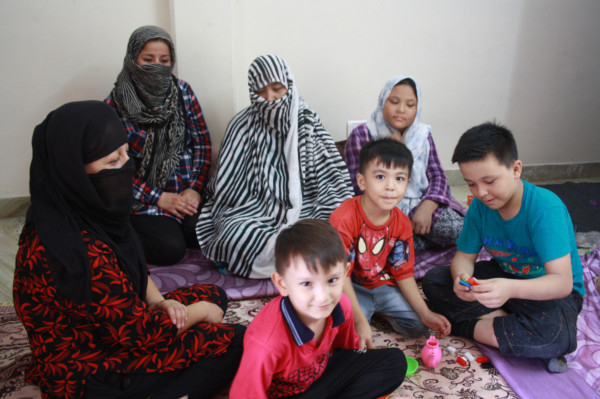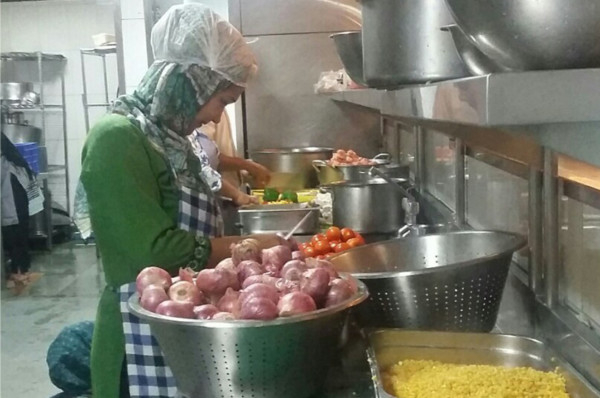
It’s a sultry afternoon in New Delhi as Qadria, an Afghan refugee, waits for her 19-year-old son to return from work at a call centre in Noida. Qadria is not sure whether to be happy or sad that her son has to earn for the family of five, including his three younger siblings. She lives each day fearing that he might lose his job. “My son has been given an ultimatum by his employer. If he is unable to open a bank account soon, he might be sacked. The company rules demand that salaries of all employees be deposited directly into their bank accounts. But no bank is ready to open my son’s account for want of documents despite knowing our situation,” she says.
For hundreds of Afghan families living in India, the refugee status and legal troubles, including not being able to open a bank account, mean that even day-to-day activities are fraught with hassles.
Qadria and her four children, who came to India in 2013, reside in a dingy, one-room set-up that can barely accommodate them. She recalls the good times back home in Afghanistan with her husband and family. “We were a happy couple and loved watching Bollywood movies together. Little did I know that the Hindi I picked up watching those films would come in handy one day.”
In 2011 Taliban kidnapped Qadria’s husband, a car dealer, along with two men. The three tried to escape in the night, but only one managed to do so. Her husband and the other man were killed.
The man who escaped later told her that he and his accomplice were spies who worked for the US Army. Qadria’s husband was inadvertently caught along with the duo while they were negotiating a car deal with him.
The spy fled to Russia along with his family, but Qadria’s world turned upside down. Soon after the incident, her in-laws began pressuring her to marry their younger son. Outraged, Qadria decided to live with her parents, taking her children along.
“My brother-in-law is a drug addict and unemployed. One day, he forcibly took the children away and threatened to kill them if I did not return. Left with no choice, I went back.” But on the pretext of visiting her parents, she fled to India with her children and two small bags.
She took up sundry jobs and managed to run the household and even get all her children enrolled in government schools. A year passed and despite the daily struggles, things seemed to have settled down. But one day, she was buying vegetables when she felt a pat on her shoulder. Qadria turned and was shocked to see her brother-in-law there.
“He tried attacking me with a knife, but when I screamed, he ran away. Days later, someone slipped a letter under the door, threatening me to return to Afghanistan. It was followed by yet another attempt to attack and gag me,” she says.
Qadria filed a police complaint against her brother-in-law, but he was never caught. The police advised her to change her residence.
Qadria was a trained college-level teacher in Afghanistan earning Rs10,000 (Dh538) monthly. Ironically, today she is unable to provide good education to her own children.
“People often ask me if I made the right decision to run away from my homeland. My answer is always yes. I led a comfortable life when my husband was alive, but after his death, I could not have lived to suffer abuse at my in-laws’ house. My son earns Rs10,000 a month and after paying the rent, we are left with barely Rs2,000 that covers electricity and water charges. But I am grateful that at least all my children are safe with me,” she says.
Decades of war in Afghanistan have seen a substantial rise in the number of Afghan refugees in India. Qadria is among scores of women who moved to India in the past three to seven years after their husbands were killed and their lives were threatened.
The United Nations High Commission for Refugees (UNHCR) statistics say India has more than 10,000 Afghan refugees and more than 1,300 registered asylum seekers are living in Delhi. UNHCR pays each family Rs3,500 to Rs4,000 a month, which is insufficient to survive in the city. So most women have to take up small jobs to sustain themselves and children.
Most of the refugees have settled in areas such as Lajpat Nagar, Jangpura, Malviya Nagar and Khirkee Extension. Even though many of them have picked up some Hindi and English, they find it difficult to converse in either of the languages. Among themselves, they speak Dari, their native language.
While all have stories of struggles, only some share their ordeals, hoping someone somewhere will help them monetarily and change their lives.
The women are unwilling to be photographed, insisting that it’s for security reasons. They are dressed in colourful salwar kameez, but invariably hide their faces with headscarves. Qadria, reasonably well-versed in Hindi, opts to act as their translator.
Farhat, the liveliest of all, says, “We face several kinds of discrimination, including having to pay higher rent every month, so whatever we earn is never enough. But then, every place has its good and bad sides. We made a choice to accept Delhi as our home, and acknowledge it graciously.”
Farhat’s husband, an Afghan army man, was killed in the war in 2011. With both her parents dead and no one to look to for support, she was left alone with a one-year-old son. “Life is not easy for a single mother in Afghanistan. After my husband’s death, my in-laws turned against me. Men wanted to befriend or marry me, but I had no desire to marry again. I just wanted to be with my son. When I rejected their proposals, they abused and stalked me. An Afghan woman coming to India agreed to help me and that’s how I came to Delhi,” she says.
Since 2013, Farhat is living in an apartment shared by three Afghan women and their children. “My son, now 4, is studying in a government school. I do sundry jobs, including assisting some well-off Afghans who come to India for medical treatment. I wash their clothes and nurse them to earn some money. I wish, like other mothers, I can give my only child a good life.”
For a lot of them, the city is home now, and the children of some have no memories of their birthplace in Afghanistan. Each woman tells her story, fumbling for words and occasionally breaking down. Others come to her comfort. The sobs make way for chatter and smiles, helping to dissipate the bitterness and dejection they feel.
As children return from school, the women hurry to change their uniforms and serve them lunch.
Nasima talks to her son in Dari, even though he speaks Hindi well — a result of studying in a Hindi medium school. A mother of eight — the oldest aged 20 and the youngest 6 — she made the journey to Delhi only with her youngest child and stays in a cramped apartment with another Afghan family. Together they pay a rent of Rs10,000 a month.
Her husband ran an automobile spare parts business, but the family fell into bad times when he was diagnosed with a heart disease. “We decided to come to India for treatment, but he died of cardiac arrest before we could make the necessary arrangements,” Nasima says.
Weighing the pros and cons of a life without her husband, she decided to move to Delhi. “We had already sold our property in Afghanistan and I saw a bleak future in that country. I had heard that several Afghan women were living in Delhi, so I imagined a better life in the city. But everything seems tough here,” she says.
However, standing strong in the face of adversities and overcoming all odds, she is hopeful that life will change once her son grows up. “He has learnt to converse in Hindi and English and finds it awkward to speak in Dari when people from Afghanistan visit us. He insists I also learn Hindi as Delhi is where we belong now.”
Khatera shares a similar story. The difference is that her husband divorced her in 2011. She does not want to go into personal details, but says, “I was forced to flee to India with my daughter, brother and sister a year after my husband divorced me. Only our mother stayed back. My brother works in a restaurant and I do small jobs to add to the family income. The meagre savings I had were gone in no time.”
Irrespective of the difficult lives they lead, none of them desires to return to Afghanistan, and the women are willing to face any challenges in the city.
Yet there’s a silver lining. In November 2015 Access, a Delhi-based NGO, initiated a livelihood promotion programme with support from UNHCR to help the women earn extra money.
Aditi Sabbarwal, the NGO’s coordinator-enterprise for the project called Ilham Afghan Cuisine, manages catering orders for the group of Afghan refugee women with her team’s support. The project aims to make these single mothers self-reliant through their culinary skills.
“The women underwent intensive enterprise development training. The purpose is to see them back on their feet and make them independent. Through this catering service, they can work towards an empowered future for their children and the community,” Sabbarwal says. “While working with the women to identify their skills, aspirations, interests and capacities, we found that cooking came to them naturally. The only requirement was to impart them with public-dealing skills. They were nervous because none had prior experience of working commercially at a public level.”
The women were only too happy when even before the catering service was introduced, Access arranged for them to participate in a cultural fair organised by Dastkar, an NGO working with craftspeople for promotion and revival of traditional crafts of India.
The shy and anxious Afghan women came out trumps showcasing their cooking skills. Used to preparing lavish meals for scores of people during feasts back home, the women were delighted when Access provided them the opportunity to participate in other crafts and food festivals held in the city.
“The project made us realise we were learning more about the city’s flavours and cultures. With hundreds of visitors thronging the stalls selling crafts, clothes, furniture and food, our stall was a hit. Many foodies told us they were drawn to out stall by the tempting aroma wafting from the far end of the fair. They loved the traditional Afghan delicacies, including Kabuli pulao, chabali kebabs [served with Afghan bread], manthu, a dumpling filled with ground mutton and onions and phirni, a rice pudding made with milk, sugar and spices,” says Qadria.
Impressed by their culinary skills, the women received catering orders from various embassies in the city and began acquiring business acumen. The amount they earned during such events helped to fulfil several of their household needs, generally postponed month after month.
With initiatives such as these, the refugee women believe they are now on the path to a better future.
Nilima Pathak is a journalist based in New Delhi.













